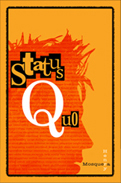
 |
Status Quo highlights Lemat's struggle to achieve success while pursuing his passion of writing. Lemat embodies the millions of individuals who find themselves in a profession they dread as their creative fire slowly withers. Stuck in a web design job that he abhors, the negative energy seeps into his home life until Lemat decides to slit his own wrists and end it all. For him, the attempt to end his life is only the beginning of a roller coaster where he reaches the highest of highs and the lowest of lows. Following Lemat’s plight, as crude as it may sound, is undoubtedly interesting and resonates strongly with anyone who does not, in their mind, lead a perfect life.
Crisp dialogue allows the book to flow well, making for a relatively quick and enjoyable read. Although many characters, especially Lemat’s friends Dep, Lisa, and Talia simply acknowledge their presence throughout most of the tale, Lemat’s relationship with Ink, the owner of a tattoo parlor, is startling, beautiful, and real. It goes without saying that sex scenes are a relatively common occurrence in Status Quo; sometimes, these scenes are just there to portray the raging carnal desires of humans. With Ink, it’s completely different. Lemat connects with her on both a creative and intellectual level.
Though this story is about Lemat’s individual desire to be a successful author, the underlying narrative is centrally focused on the pursuit of the American dream and ultimately happiness. Having left his birthplace, Caracas, Venezuela in his childhood, Lemat struggles to sustain strong relationships with his parents or anyone for that matter. If he has anything, it is a burgeoning imagination filled with electrifying stories that no one wanted any part of.
When Lemat meets a random individual named Guy, it’s almost as though fate has taken a man’s form to apologize for the hand he is dealt. Guy presents a way for him to escape his misery and the hundreds-long list of rejections for his completed manuscripts. The similarities between F. Scott Fitzgerald’s Jay Gatsby and Lemat are many; both are smitten and in search of their picturesque future, and both receive that one opportunity to essentially sell their soul for fame and fortune.
Mosquera portrays the not-so-pretty aspect of being a celebrity. One of the penetrating questions the novel presents to the reader, through Lemat, is simply, how can an individual be unhappy when he has nothing, and be just as unhappy when he seemingly has everything? Witnessing Lemat’s attempt to resolve this dilemma and achieve harmony with himself and those around him is what makes this book a thrilling read.
At a deeper glance, Mosquera also tackles one of the most relevant literary debates of the millennial generation: traditional publishing versus self publishing. The aspiring writer, particularly before the turn of the century, had one route to become an author: traditional publishing. Unfortunately, this route was rife with rejection. With pioneers like Amanda Hocking and Hugh Howey, along with the Kindle Direct Publishing platform on Amazon, the Indie publishing movement has proven it is here to stay. Amazon’s publishing venture provides a platform for any voice to be heard, a fact that Lemat points out on numerous occasions. Whether it is dealing with an agent, negotiating directly with publishers, or navigating the self-publishing industry, the author provides valuable insight into the inner-workings of the publishing world.
Should an individual who has not achieved his “happy-medium” in life continue with the status quo? Many do, and those that dare to break from the mold accept the risk and rewards attached. Such is the story of Lemat, and without a doubt, it will keep the reader turning the pages as they root for fate to bestow some generosity on the main character.
RECOMMENDED by the US Review